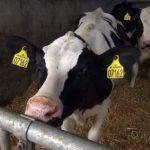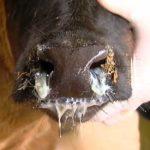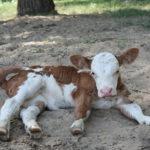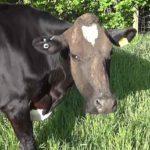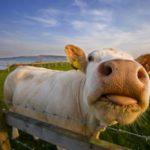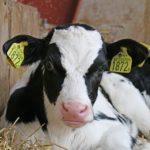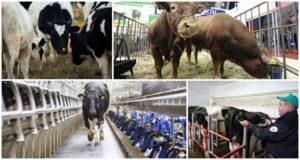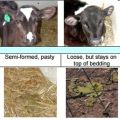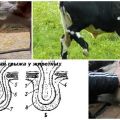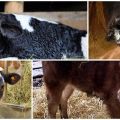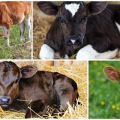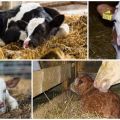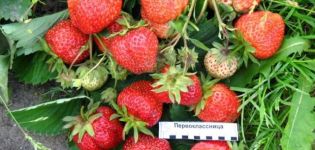What to do if a calf has snot and what are the causes, treatment and prevention
In cows and calves, as in humans, coughing can be a symptom of respiratory problems. These can be mild illnesses, such as a cold, or serious ones, such as pneumonia. To find out the reasons, establish a diagnosis and select a treatment, you need to contact a veterinarian, but the breeder himself can help the animal if he knows what to do if the calf has snot. Let's consider some cases, symptoms of which diseases can be snot and a therapy regimen.
Causes of a runny nose in a calf
A runny nose in cattle can occur for several reasons, often it is an allergy to substances, infections, respiratory and other diseases, or such a symptom manifests itself as errors in keeping livestock.
Allergy
The most common form of allergy in cows is food allergy. This is the reaction of the animal's body to any substance in the composition of the feed, to which the calf's body responds with an allergic reaction. The manifestation of allergies can be diverse, snot is a frequent and unmistakable sign. Allergy snot is liquid, transparent, odorless.
In the acute course of allergies, treatment is prescribed - intramuscular administration of antihistamines and corticosteroids, antiseptics and vitamins. The calf should be kept separate from the rest of the animals during treatment. In order to prevent allergies in the future, it is necessary to establish what caused the allergy and exclude this product from the animal's diet.
Respiratory tract diseases
Respiratory diseases in calves, accompanied by a runny nose, develop in the cold season, in winter or spring. The reason is sudden jumps in air temperature, humidity, accumulation of gases due to rare ventilation, decreased immunity of calves due to hypovitaminosis. In the summer, diseases can occur due to overheating and humidity.
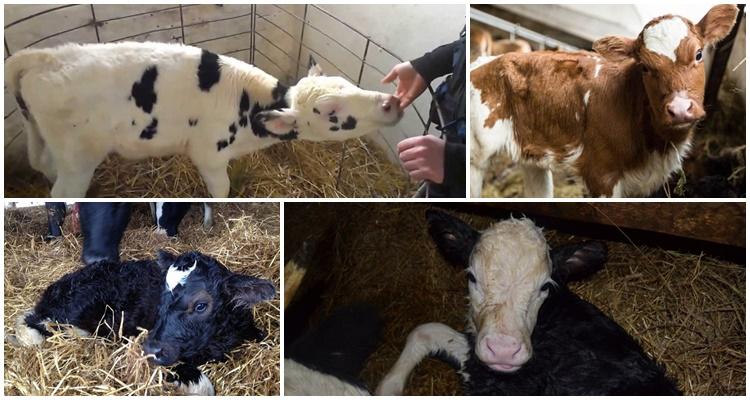
Among respiratory diseases in calves, bronchopneumonia is more common, which ranks second after diseases of the gastrointestinal tract. With this disease, the bronchi and lungs are affected. Pathology can occur in acute, subacute and chronic forms. Without treatment, the consequences of the disease are serious damage to the lungs and heart.
Infectious diseases
Infectious damage to the lungs of calves is caused by viruses, as a result of which rhinotracheitis, parainfluenza and similar diseases develop. As a result of infections, the mucous membranes of the upper respiratory tract are affected. Against this background, the protective functions decrease, bacteria and fungi infect the lower parts of the respiratory system.
Cows in the household can get sick with tuberculosis, the appearance of which in the herd is facilitated by poor feeding, keeping in a dark damp calf barn. The symptoms of tuberculosis are changes in mood and behavior, unwillingness to eat, depression. The animal breathes through the mouth, you can see the release of exudate from the nostrils, then a cough appears, at first dry and sharp, then turns into a wet and soft one. Sick animals need mandatory antibiotic treatment, which can only be prescribed by a veterinarian.
Nodular dermatitis
It is an infectious bovine disease caused by a virus. Symptoms include fever, subcutaneous tissue edema, skin nodules, and damage to the eyes and mucous membranes of the digestive tract and respiratory system. The virus is transmitted among cows through the bites of blood-sucking insects such as flies, mosquitoes, mosquitoes. For the prevention of lumpy dermatitis, vaccination is carried out, immunity lasts 1 year.
Treatment of the disease is symptomatic; if any suspicious signs appear, you should immediately contact your veterinarian.
Content rules violation
The occurrence of a symptom such as a runny nose in calves is facilitated by the absence or lack of walking, sunlight, high humidity, and drafts. And also low or, conversely, high temperature in the room, as a result of which the activity of the immune system decreases. Improper feeding, hypovitaminosis, lack of proteins, irregular cleaning and disinfection also lead to these results.
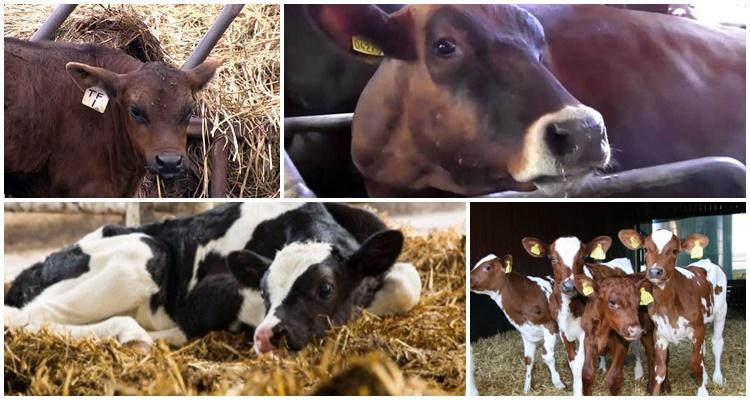
Diagnosis of diseases
If a runny nose is found in calves, do not rely on the fact that it will go away on its own and the animal will recover. If you do not take measures, then the intensification of the disease can lead to a slowdown in development, and in case of complications, to the death of the animal.
Do not treat the calf with self-prescribed drugs. Only a veterinarian can make the correct diagnosis and choose a treatment.
What to do if a cow has snot
Before the arrival of the veterinarian, you should immediately remove the calf or cow from other animals so as not to expose the herd to the risk of infection. Folk remedies can help: decoctions of thyme and coltsfoot. Decoctions normalize the production of mucus in the bronchi, strengthen the body, and destroy pathogenic bacteria. You can use warming compresses, rubbing, inhalation.
But folk remedies alone are not always able to completely solve the problem, so the veterinarian should prescribe the main treatment. How long the calf needs to be treated depends on the severity of the disease and the animal's ability to resist the disease. Complex treatment is usually prescribed with the use of several antibacterial and antiviral drugs.
Prevention measures
To prevent animals from catching cold, you need to create the necessary conditions for them: keep the cows in a warm, dry and carefully ventilated area. It should be free of drafts and dust. The barn should be cleaned daily, litter should be changed, ventilated. At least 2 times a year, in the spring, before the start of the grazing season, and in the fall, after the end, disinfect the entire premises and equipment.
Hypothermia of young animals should not be allowed, especially after they have been standing in a warm room or after transportation. Also, do not give the calf cold water if the animal is hot after a walk.
To strengthen the immunity of cattle, you need to walk the cow and calf every day to give them the opportunity to move, breathe fresh air, and get sunbathing. Attention should be paid to the diet, to select feed so that the components correspond to the physiological needs and age of the cows. The diet should have a sufficient amount of protein, carbohydrates, vitamins and minerals.
The causative agents of some diseases can be transmitted through milk from the mother to the calf, therefore, if a cow is sick, it is necessary to monitor the condition of the young more closely than usual. Or, if possible, feed the calf milk from another animal until the cow recovers.
Calf snot can be a sign of serious medical conditions that require immediate treatment. It can be a cold that the animal can cope with on its own after a while, but it is often a sign of serious respiratory pathologies that, if untreated, lead to poor health or death of young animals.
